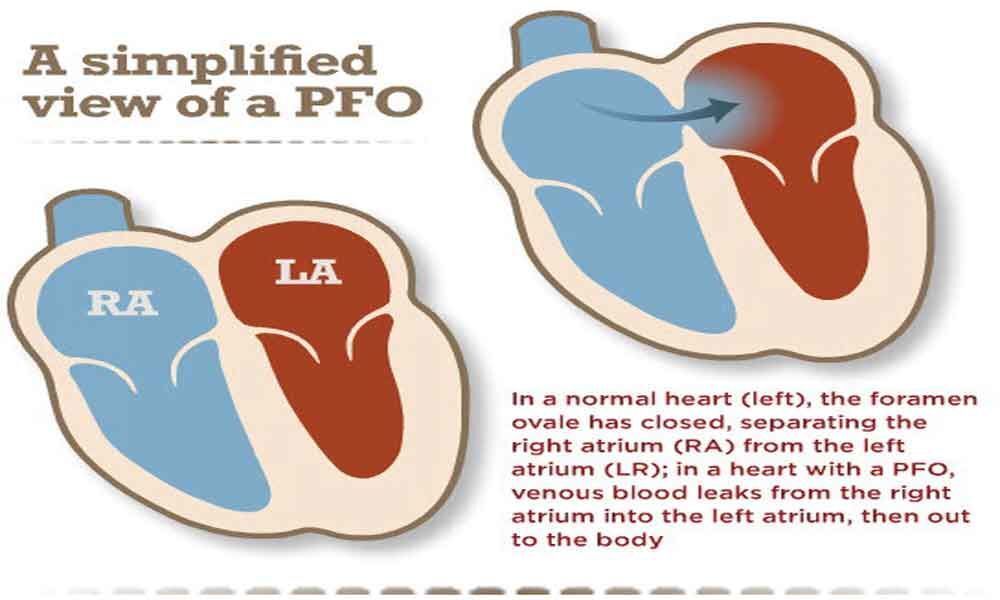Live
- Bangladesh requests India to extradite Sheikh Hasina
- Women, elderly register for AAP 's welfare schemes
- Cyber Security Mela -2024 held
- Record 10 lakh govt jobs provided in 18 months: PM
- MyVoice: Views of our readers 24th December 2024
- Centre scraps 'no-detention policy' for Class 5, 8 students
- Waste to Worth: Be Excreta Wise
- Officials told to resolve issues of differently-abled
- Israel orders ‘impossible’ evacuation
- Farmers plead for justice as govts betray them
Just In

Continental Hospital has performed a transcatheter repair of Patent Foramen Ovale (PFO) or hole in the heart.
Hyderabad: Continental Hospital has performed a transcatheter repair of Patent Foramen Ovale (PFO) or hole in the heart. The patient, a 55-year-old male, suffered from a cryptogenic stroke and had been referred to the cardiology department for an evaluation of potential cardiac causes leading to the stroke. During the assessment, the doctors identified that the patient had PFO. In rare cases, PFO is known to lead to stroke.
If PFO is present in a case of Cryptogenic Stroke, then it has to be closed, in order to prevent recurrent stroke attacks. While the minor risk could lead to stroke at any age, it is suspected, especially in young stroke patients.
During fetal development, a small flap-like opening - Foramen Ovale - is normally present in the wall between the right and left chambers of the heart. This typically closes during infancy. In some cases, when the Foramen Ovale doesn't close, it is termed as a Patent Foramen Ovale (PFO).
Interestingly, PFO occurs in about 25% of the normal population, but most people with the condition never know that they have it. In a cryptogenic stroke, case where the cause of the stroke is obscure or unknown, a complete cardiac investigation should be carried out to rule out rare causes such as these.
"The patient had no apparent causes of stroke and hence, he had been classified as having suffered from cryptogenic stroke. He was referred to us by our neuro team, to carry out a complete cardiac evaluation. During tests, we identified that the patient had a Patent Foramen Ovale and that potentially it was the cause for the stroke, as there were no other risk factors.
Hence, we opted to close the PFO using a minimally invasive technique that allows us to insert and plug a device in the PFO through a small incision made in the groin," said Dr Abhisekh Mohanty, consultant interventional cardiologist at Continental Hospitals.
The procedure went smoothly and lasted just over 30 min and the patient was mobile after 3 hours and was also discharged the next day. In addition, the patient has been prescribed a low dose of blood thinners for a few months. He would require a few follow ups to determine his progress. Currently, the patient is doing fine and has not had any new episodes of brain stroke.
It is important to note that PFO closure should be performed only after effectively ruling out any other causes of stroke. The benefit of PFO device closure in cryptogenic stroke has been long debated. Only recently two large multinational randomized patient trials named RESPECT and REDUCE trials, proved the benefit after which it received acceptance in the medical community.
Therefore, it is still a relatively new procedure and hence, not commonly performed. In South India, data is unclear on the number of PFO closure procedures that have been successfully completed. Though, in Hyderabad, 4 such cases have been reported, so far.
Through a comprehensively designed program comprising of contemporary medical invasive and non-invasive techniques, state of the art technological and infrastructure framework, Continental Hospital offers an entire range of services- from diagnosis to rehabilitation.
The team of cardiologists is extensively trained in diagnosis, treating and implementing corrective procedures in the most complex forms of cardiovascular diseases and malfunctioning conditions.

© 2024 Hyderabad Media House Limited/The Hans India. All rights reserved. Powered by hocalwire.com







